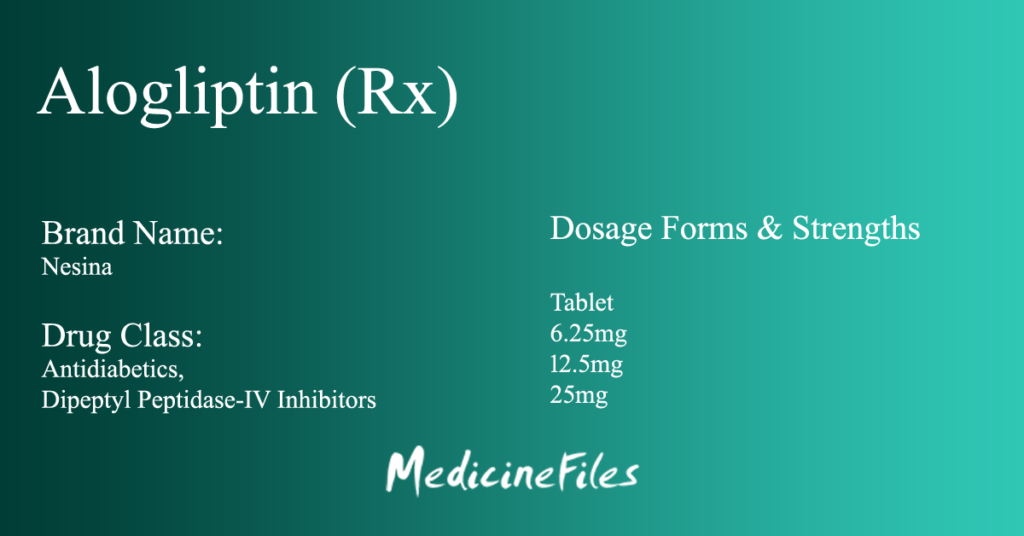Acarbose(Rx)
Acarbose Brand name: Precose, Glucobay, Prandase
Dea Class: Rx (Prescription drug)
Drug Class: Antidiabetics, Alpha-Glucosidase Inhibitors
Dosage form: Oral Tablet: 25mg, 50mg, 100mg
In this post
What is Acarbose and how does it work?
It is an oral alpha-glucosidase inhibitor; minimal systemic absorption
Used for the treatment of type 2 diabetes mellitus
Agents in this class have only modest effects on A1C (i.e., mean 0.3% to 0.7% reduction)
What are Acarbose uses?
It is used for the treatment of type 2 diabetes mellitus as an adjunct to diet and exercise.
It helps lower your blood sugar together with diet and exercise.
How should I take Acarbose?
- You need to take this medication with food. Acarbose only works when there’s food in your stomach. Take it with your first bite of each main meal.
- Don’t crush this tablet. Crushing it may cause more stomach problems like bloating, gas, or stomach pain.
Acarbose Side Effects
The common side effects don’t need medical attention and will disappear as your body adjusts to the dosage. But if you are facing any serious or rare side effects, then immediately seek medical attention.
The more common side effects from using acarbose include:
- stomach pain
- diarrhea
- flatulence (gas)
Serious side effects and their symptoms can include the following:
- Allergic skin reaction. Symptoms may include:
- rash
- redness
- swelling of your skin
- Liver problems. Symptoms may include:
- yellowing of the whites of your eyes or skin
- stomach swelling
- pain in the upper right portion of your stomach
- Pneumatosis cystoides intestinalis. These are gas-filled cysts on the wall of your intestines. They can cause intestinal problems, such as holes, blockage, or bleeding. Symptoms may include:
- diarrhea
- mucus discharge
- rectal bleeding
- constipation
What Are Warnings and Precautions for Acarbose?
Warnings
No clinical studies exist establishing conclusive evidence of macrovascular risk reduction with acarbose or any other anti-diabetic drug
When diabetic patients are exposed to stress such as fever, trauma, infection, or surgery, a temporary loss of control of blood glucose may occur; at such times, temporary insulin therapy may be necessary
Monitoring glycemic control with 1,5-AG assay is not recommended; measurements of 1,5-AG are unreliable in assessing glycemic control in patients taking acarbose; use alternate methods to monitor for glycemic control.
Before taking Acarbose, Cautions
- Tell your doctor and pharmacist if you are allergic to acarbose or any other drugs.
- Tell your doctor and pharmacist what prescription and nonprescription medications you are taking, especially other medications for diabetes, digoxin (Lanoxin), diuretics (‘water pills’), estrogens, isoniazid, medications for high blood pressure or colds, oral contraceptives, pancreatic enzymes, phenytoin (Dilantin), steroids, thyroid medications, and vitamins.
- Ask your doctor if you have or have ever had ketoacidosis, cirrhosis, or intestinal disease such as inflammatory bowel disease or bowel obstruction.
- Tell your doctor if you are pregnant, plan to become pregnant, or are breast-feeding. If you become pregnant while taking acarbose, call your doctor.
- If you are having surgery, including dental surgery, tell the doctor or dentist that you are taking acarbose.
Pregnancy and Lactation
Pregnancy Category: B
Lactation: not known if crosses into breast milk, avoid using in nursing women
What Are Dosages of Acarbose?
Dosage Forms & Strengths
Dosage form: Oral Tablet: 25mg, 50mg, 100mg
150 mg/day PO if patient weighs <= 60 kg. 300 mg/day PO if patient weighs > 60 kg.
150 mg/day PO if patient weighs <= 60 kg. 300 mg/day PO if patient weighs > 60 kg.
Safety and efficacy have not been established.
Safety and efficacy have not been established.
Acarbose Brand Name
- Glucobay: 100 mg, 50mg
- Prandase: 25mg
- Precose: 25mg
Also Read:
Vildagliptin uses, side effects, dosage, warnings
Colesevelam Hydrochloride uses, side effects, dosage, warnings
Glimepiride, Oral Tablet uses, side effects, dosage, warnings


